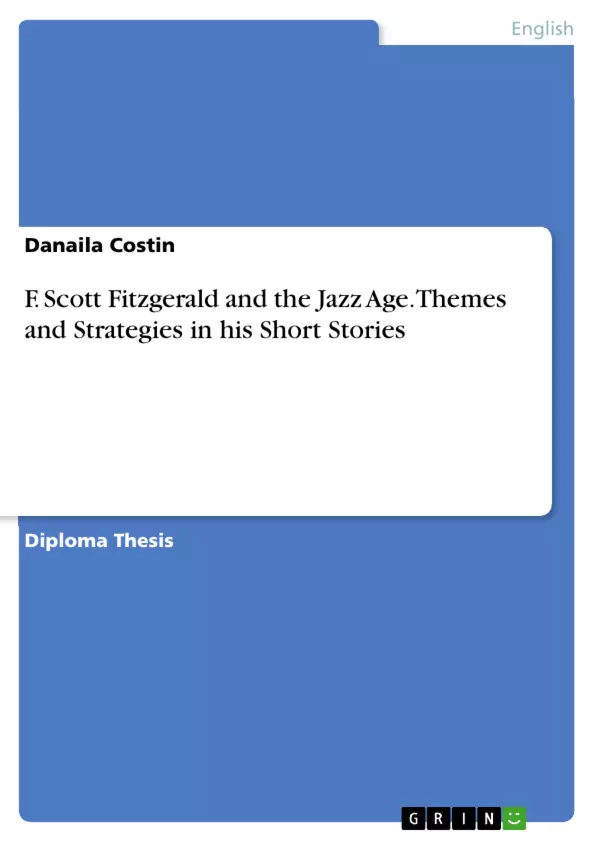The present paper tries to capture the very essence of the 20th century in Fitzgerald’s universe of fiction, mainly the short one.
The first chapter, “20th Century American Short Fiction”, picks up three of the best short story writers of the 20th century and their career as professional writers. The aim was to reveal the way the relationship between the reader and the text establishes, how the text is received and what the reader brings to the reading.
The second chapter, “The Modern World as Reflected in F. Scott Fitzgerald’s Short Stories”, introduces the rich context of the Jazz Age (a name Fitzgerald himself invented), a period of wild economic prosperity, cultural flowering and a shaking up of social mores. It was also the defining era of Fitzgerald’s life as a writer with jazz playing a significant part in wider cultural changes. Subsections 2.2 to 2.4 are dedicated to the best part of Fitzgerald’s career as a writer of most remarkable tales.
The final chapter, “Themes in and Critical Views of Fitzgerald’s Most Popular Short Stories”, closes the research with the analysis of the main themes and critical views about this category of Fitzgerald’s fiction, with a particular focus on my own vision on "The Curious Case of Benjamin Button", in fact a paper that I presented at a round table named “Literature and life Critical Chatting: F. S. Fitzgerald’s “The Curious Case of Benjamin Button”; H. Melville’s “Bartleby, the Scrivener. A Story of Wall Street”, at the Students’ Scientific Session on 27 May 2015, organized by the Faculty of Letters.
Inhaltsverzeichnis (Table of Contents)
- Argument
- Paper Presentation
- Chapter I: 20th Century American Short Fiction
- 1.1 Most popular American short story writers
- 1.1.1 Ernest Hemingway
- 1.1.2 F. Scott Fitzgerald
- 1.1.3 Stephen King
- 1.2 Short stories. From writing to reading
- 1.3 Tips and tricks on how to write short fiction
- 1.1 Most popular American short story writers
- Chapter II: The Modern World as Reflected in F. Scott Fitzgerald's Short Stories
- 2.1 Living in the Jazz Age
- 2.2 "Tales of the Jazz Age" (1922)
- 2.2.1 "The Camel's Back"
- 2.2.2 "May Day"
- 2.3 "Flappers and Philosophers" (1920)
- 2.3.1 "Bernice Bobs Her Hair"
- 2.4 "All the Sad Young Men" (1926)
- 2.4.1 "Winter Dreams"
- Chapter III: Themes in and Critical views of Fitzgerald's Most Popular Short Stories
- 3.1 Critical views
- 3.2 Themes
- 3.3 Critical chatting: "The Curious Case of Benjamin Button”
- Conclusions
- Sources
Zielsetzung und Themenschwerpunkte (Objectives and Key Themes)
This paper explores the essence of the 20th century in F. Scott Fitzgerald's short fiction, focusing on the Jazz Age and its impact on his writing. The paper aims to analyze the relationship between the reader and the text, highlighting how the text is received and what the reader brings to the reading experience. It also examines the themes and critical views surrounding Fitzgerald's most popular short stories.
- The impact of the Jazz Age on American society and literature
- Themes of love, loss, disillusionment, and the American Dream in Fitzgerald's short stories
- The role of character development and narrative techniques in creating engaging and impactful short stories
- Critical perspectives on Fitzgerald's work, including his portrayal of women and his exploration of social class
- The enduring relevance of Fitzgerald's stories in the 21st century
Zusammenfassung der Kapitel (Chapter Summaries)
Chapter I provides an overview of 20th century American short fiction, focusing on the careers of Ernest Hemingway, F. Scott Fitzgerald, and Stephen King. It examines the relationship between the reader and the text, highlighting how the text is received and what the reader brings to the reading experience. The chapter also offers tips and tricks on how to write short fiction.
Chapter II explores the Jazz Age, a period of wild economic prosperity, cultural flowering, and a shaking up of social mores. This chapter examines how Fitzgerald captured the essence of this era in his short stories, focusing on collections such as "Tales of the Jazz Age" and "Flappers and Philosophers." It explores specific stories like "The Camel's Back," "May Day," and "Bernice Bobs Her Hair," highlighting key themes and narrative elements.
Chapter III delves into the themes and critical views surrounding Fitzgerald's most popular short stories. It analyzes the main themes found in his work, including love, loss, disillusionment, and the American Dream. The chapter also explores critical perspectives on Fitzgerald's portrayal of women and his exploration of social class. It includes a discussion of "The Curious Case of Benjamin Button," highlighting its unique narrative structure and themes.
Schlüsselwörter (Keywords)
This paper focuses on the following key terms and concepts: F. Scott Fitzgerald, Jazz Age, American short fiction, themes, critical views, character development, narrative techniques, "The Curious Case of Benjamin Button," "Bernice Bobs Her Hair."
Frequently Asked Questions
What is the 'Jazz Age' in Fitzgerald's literature?
The Jazz Age, a term coined by Fitzgerald, refers to the 1920s—a period of economic prosperity, cultural flowering, and changing social mores reflected in his stories.
What are the main themes in F. Scott Fitzgerald's short stories?
Key themes include love, loss, disillusionment, the pursuit of the American Dream, and the complexities of social class.
How does 'The Curious Case of Benjamin Button' differ from his other works?
The paper analyzes its unique reverse-chronological narrative structure and how it explores life and time differently than his more realistic Jazz Age tales.
Which other 20th-century authors are compared in the paper?
The paper provides context by discussing the careers of Ernest Hemingway and Stephen King alongside Fitzgerald.
What is the significance of the short story 'Bernice Bobs Her Hair'?
It is examined as a reflection of the 'Flapper' culture and the shifting social dynamics and philosophies of the early 1920s.
- Quote paper
- Danaila Costin (Author), 2015, F. Scott Fitzgerald and the Jazz Age. Themes and Strategies in his Short Stories, Munich, GRIN Verlag, https://www.grin.com/document/323386



